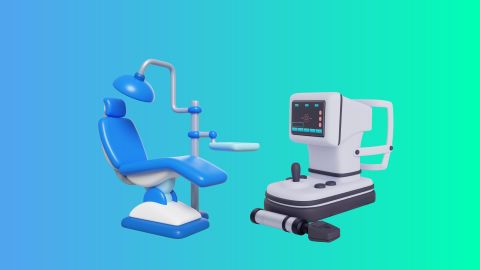A syringe pump is a medical device that provides precise control over the delivery of fluids or medications in small, accurate amounts. These pumps are widely used in hospitals and medical settings. In this article, we'll explore the definition, types, uses, benefits, and pricing of syringe pumps in India, helping you understand the value of investing in this medical equipment.
What is a medical syringe pump?
A syringe pump is a mechanical medical equipment used to precisely administer fluids, medications, or nutrients into a patient’s body. Unlike traditional methods of administration, syringe pumps deliver a controlled and steady amount of fluid over a specific period. This device is mainly used in critical care environments, such as operating rooms, intensive care units (ICUs), and hospitals. It helps manage small doses of medication, ensuring that patients receive the right amount at the right time.
Features of a Syringe Pump
Modern syringe pumps come with advanced functions that enhance precision, usability, and versatility. Key features include:
- Programmable settings for improved accuracy and control
- Computer connectivity for recording and monitoring infusion history
- Adjustable syringe holders to support varied applications
- Dual functions for infusion and withdrawal, with capacity for up to 11 syringes
- Ability to operate at very small volumetric flow rates (micro, nano, pico) with high precision and pulseless flow
- Pressure control suitable for high-viscosity liquids or high-pressure fluid delivery
- Syringe heaters for maintaining temperature control
- Option to switch between syringes to extend the working range
Uses of the syringe pump
The syringe pump has several important applications in the medical field. Here are some of the most common uses:
- Administration of medications: It is used to administer precise doses of drugs to patients, ensuring consistent delivery.
- Infusion therapy: Syringe pumps are ideal for fluid infusion in critical care settings.
- Laboratory experiments: They are also used in laboratory settings for precise fluid delivery.
- Palliative care: Syringe pumps help administer pain-relief medications in controlled doses for terminal patients.
- Chemotherapy: They are essential for the controlled delivery of chemotherapy drugs.
How does a syringe pump work?
A syringe pump works by slowly pushing the plunger of a syringe to administer a fluid or medication. It has adjustable settings for flow rates, volumes, and infusion duration. Here’s how it works in simple steps:
- Step 1: The syringe is filled with the medication or fluid to be administered.
- Step 2: The syringe is placed in the pump, and the settings are adjusted for the required dose.
- Step 3: The syringe pump begins pushing the plunger to deliver the medication at a constant rate.
- Step 4: The rate of infusion is carefully controlled, ensuring accurate delivery.
Types of syringe pumps
There are several types of syringe pumps, grouped by their function and use:
Types based on function
- Infusion only pumps: Deliver fluids at a steady and continuous rate over a set period, commonly used for long-term medication delivery.
- Infusion and withdrawal pumps: Can both infuse and withdraw fluids, making them useful for applications that require refilling, sampling, or fluid exchange.
- Continuous flow pumps: Use a push-pull mechanism to ensure uninterrupted fluid flow without pauses or pressure drops.
- Volumetric infusion pumps: Dispense a precise, pre-programmed volume of fluid with high dosing accuracy.
Types based on application and performance
- High-pressure syringe pumps: Generate a strong force to push fluids through narrow tubing or small-diameter needles where resistance is high.
- Low flow rate syringe pumps: Designed for extremely precise and smooth delivery at very low flow rates using fine syringes.
- Laboratory syringe pumps: Programmable pumps used in research and scientific experiments for controlled fluid handling.
- Medical syringe pumps: Used in clinical environments for patient care and equipped with safety features such as alarms and dosage limits.
Recent technological innovations in healthcare equipment have significantly impacted how these pumps operate, with devices like nano machines enabling precise medical applications.
Examples of syringe pump applications
Syringe pumps enable highly accurate, pulse-free fluid delivery, making them ideal for micro to nano litre flow applications. They support programmable flow patterns such as stepped dosing, gradual ramps, timed delivery, and fluid withdrawal for sampling.
These pumps are widely used in chemistry for precise reagent addition, mixing, and controlled dosing in continuous flow reactions. In neuroscience, they allow accurate microdose delivery to targeted brain regions. In biomedical engineering and cell biology, syringe pumps are used to supply nutrients and reagents to tissue culture systems.
They also play a key role in protein purification, chromatography, and analytical techniques such as HPLC and LC MS by ensuring stable and consistent flow. In materials and environmental science, syringe pumps support reproducible sample deposition for nanomaterials, thin films, and coatings. For microfluidics and other pressure-sensitive experiments, they provide consistent flow conditions essential for reliable results and measurement accuracy.
Price range of syringe pump in India
In India, syringe pump prices differ based on design, functionality, accuracy level, and brand.
Type of Syringe Pump |
Description |
Approximate Price Range (₹) |
Single channel basic |
Standard pumps used in general wards to administer one fluid or medication at a time |
₹12,000 to ₹35,000 |
Dual or multi channel |
Allows simultaneous delivery of two or more medications, commonly used in ICUs and critical care |
₹30,000 to ₹60,000 and above |
High end or speciality |
Advanced models for TIVA, neonatology, or laboratory research with high precision and drug libraries |
₹50,000 to ₹1,95,000 and above |
Factors to consider when buying a syringe pump
When buying a syringe pump, here are some important factors to keep in mind:
Performance and technical specifications
- Flow rate and volume: Ensure the pump supports the minimum and maximum flow rates required and can handle the viscosity of the fluids being deliverd.
Syringe compatibility: Check that the pump works with the syringe sizes and brands you commonly use.
Accuracy and precision: Look for models that offer consistent and reliable dosing accuracy, especially for critical applications.
Number of channels: Decide between single-channel or multi-channel pumps based on whether simultaneous infusions are needed.
Pressure capability: Confirm the pump can generate sufficient pressure for thicker or viscous fluids.
Usability and safety features
User interface: Choose a pump with a clear display and simple setup to reduce handling errors.
Control modes: Ensure availability of manual, automatic, or programmable modes as required.
Alarm systems: Verify the presence of essential alerts such as occlusion, empty syringe, or power failure.
Safety locks: Look for locking features that prevent accidental changes to settings.
Application and operating environment
Fluid type: Confirm the pump is suitable for the specific liquids or medications you plan to use.
Portability: Consider size and weight if the pump needs to be moved frequently or used bedside.
Connectivity options: Check compatibility with hospital systems or laboratory software if integration is required.
Reliability and support
Build quality: Opt for pumps with durable construction suitable for continuous operation.
Battery life: Ensure adequate battery backup for extended use during power interruptions.
Warranty and service: Select brands that offer a comprehensive warranty and dependable service support.
Accessories availability: Make sure compatible accessories and spare parts are easily accessible.
For comprehensive patient monitoring, infusion pumps are often used alongside imaging tools such as an echocardiogram machine in cardiac care units.
Difference between a syringe and infusion pump
Feature |
Infusion Pump |
Syringe Pump |
Primary use |
Delivers larger fluid volumes for hydration, feeding therapy, or long-term medication infusions such as chemotherapy |
Administers very small, precise doses of concentrated medicines, often referred to as micro-dosing |
Fluid source |
Draws fluid from an IV bag or bottle through an infusion set |
Uses a single syringe loaded into the pump, with the motor controlling the plunger |
Volume capacity |
High capacity, ranging from several hundred millilitres to over a litre |
Limited to the syringe size, usually between 5 mL and 60 mL |
Mechanism |
Operates using peristaltic rollers or piston systems to push fluid through tubing at a steady rate |
A motorised piston steadily advances the syringe plunger to release fluid at a programmed rate |
Accuracy |
Accurate, with flow variations typically within ±5%, though less precise at very low flow rates |
Extremely precise, with variations around ±2%, making it ideal for critical and sensitive drug delivery |
Applications |
IV fluids and antibiotics in general wards Blood transfusions Pain management such as epidural infusions |
Neonatal care for premature babies Critical care delivery of potent drugs like insulin or vasopressors Anaesthesia administration during surgery |
Size and portability |
Larger in size, usually fixed at the patient’s bedside in hospitals or ICUs |
Compact and portable, suitable for patient transport and mobile se |
Difference between a Single and Dual Syringe Pumps
Feature |
Single Syringe Pump |
Dual Syringe Pump |
Number of Syringes |
One |
One or two |
Operation |
Single, independent channel |
Two independent channels |
Functionality |
Infusion or withdrawal of a single fluid |
Simultaneous infusion/withdrawal, mixing, or sequential dispensing |
Complexity |
Simpler to set up, control, and maintain |
More complex design and operation for advanced tasks |
Cost |
Generally more affordable |
More expensive due to increased versatility and functionality |
Difference between a Displacement and Pressure-Based Syringe Pumps
Feature |
Displacement Syringe Pump |
Pressure-Based Syringe Pump |
Primary Control |
Flow rate |
Pressure |
Mechanism |
Motor controls plunger movement speed |
Feedback loop uses pressure sensor to adjust flow |
Performance with Variable Back Pressure |
Inaccurate/struggles |
Compensates and performs well |
Performance with Viscous/Compressible Fluids |
Inaccurate/struggles |
Performs well |
Accuracy |
High precision in volume delivery |
High stability in pressure delivery |
Complexity |
Simpler to use and integrate |
Requires more complex control systems |
Conclusion
A syringe pump is an essential medical device used to administer fluids and medications with great accuracy. It ensures that the right dose is delivered to patients at the right time, offering multiple benefits in both clinical and research settings.
Timely updating your equipment is important to ensure better patient care. Financing options like Medical Equipment Finance, Doctor Loan, or Professional Loan from Bajaj Finance can make the process of acquiring new devices more manageable and hassle-free.




